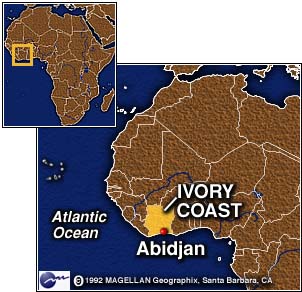Ivory Coast: An Introduction to the Conflict (Purefoy)
 Christian Purefoy writes for CNN:
Christian Purefoy writes for CNN:
Latest (10 April): The Battle for Abidjan
The west African country of Ivory Coast --- also known as Cote d'Ivoire --- has been rocked by civil conflict as forces loyal to opposition leader Alassan Ouattara seek to oust incumbent president Laurent Gbagbo after a disputed presidential election last November. Most of the international community recognize Ouattara's victory and are urging Gbagbo to go.
What's the wider background to the unrest?
Ivory Coast, which won independence from France in 1960, is one of west Africa's leading powers and, historically, had been one of its success stories.
It's a young nation: 40% of its 21.5 million population are under the age of 14, while only 3% are older than 65.
During the late 1990s, Ivory Coast enjoyed an economic boom thanks to market liberalization and reform. Large numbers of economic immigrants flocked to the region to work in cash crop industries including coffee, palm oil, rubber and especially cocoa (Ivory Coast generates 40% of the world's cocoa crop.)
But when the bubble burst, civil war followed, with economic migrants among the victims.
The country was unofficially divided in two. The government-held south is centered around Abidjan, the biggest city and commercial hub. It's a strongly Christian region and home to many Gbagbo supporters, who have traditionally held positions of wealth and power in Ivory Coast In contrast Ouattara hails from the rebel-held north, which is dominated by Muslim immigrants who have become key businessmen and traders.
At the start of 2011 the United Nations peacekeeping force had an estimated 9,000 uniformed personnel stationed in Ivory Coast.
Is religion a key part of the conflict?
No. Muslims often live in the south of Ivory Coast while Christians also reside in the north.
The issue for many citizens is what constitutes an Ivorian - and this comes down to where someone lives rather than their religious beliefs. Gbagbo, for example, has made frequent play of Ouattara as being an outsider and unpatriotic.
Why was the election in November 2010 so important?
Gbagbo, who came to power in 2000 following a disputed vote, has repeatedly postponed democratic elections for the past decade.
A presidential election held on November 28 2010 declared Ouattara the winner --- but Gbagbo alleged the vote had been rigged in the north. The United Nations said that while the election had suffered from vote rigging, the irregularities had not been enough to impact the result.
Since then the international community, including the United States, the EU, the African Union and regional body ECOWAS (the Economic Community Of West African States), have all recognized Ouattara's victory and urged Gbagbo to go.
A United Nations resolution last week imposed sanctions on the incumbent president, his wife and three associates, demanding he leave immediately. It also gave more power to peacekeepers to protect civilians.

 Monday, April 4, 2011 at 7:45
Monday, April 4, 2011 at 7:45
Reader Comments